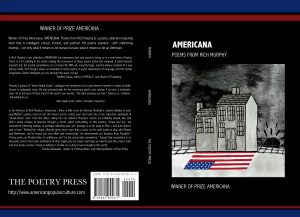
The Poetry Press
83 pages, $15
Review by Stanton Hancock
The literary canon is full of examples of writers who head out in search of America. In his third full-length poetry collection Americana, the aptly titled winner of Prize Americana, Rich Murphy embarks on his own journey across the American landscape. However, this is an America greatly changed from the land romanticized and idealized by writers like Kerouac. Rather, this is an America that has failed to live up to its potential. Murphy examines the shining city on the hill fallen to squalor and explores the superficiality of contemporary consumerism. This is not to suggest that Murphy’s collection is simply a cynical mockery of modern America but more so an exploration of American culture. In Americana, Murphy asks the tough questions, “Where did we go wrong?” and “What have we become?”
Whereas other explorations of what it means to be an American have often pulled back and viewed this country with a wide-angle lens, focusing on the open road and expansive metropolitan sprawl, Americana instead zooms in and examines American life from what is at times an uncomfortably close perspective. Consider the opening poem “Western State Penitentiary” which examines a life trapped in a prison. “Entering the prison yard / by way of the womb / and leaving only as the fertilizer / for another civilization . . . ”
While Murphy does not specifically disclose the nature of the inmate’s incarceration, the poem’s brevity and short lines expertly convey a sense of being trapped. However, this poem’s length is not an exception in this collection. With very few exceptions, the poems in Americana occupy a single page. This brevity causes the book to seem more like a collection of snapshots than a continuous narrative. The reader must absorb the poem’s content in just a few short stanzas before moving on to the next. While this fragmented nature could be disorienting in a lesser-quality collection, Murphy deftly crafts short poems that manage to be both striking and meaningful without a need for excessive rambling stanzas. Take for example the poem “City Welfare,” which opens with the short lines:
The sky is threadbare these mornings.
When the horizons are put on,
the sun is out at the elbows.
Lines like these are where Americana truly shines. As Murphy jumps between settings and scenarios, the quality of his craft allows the reader to become immediately immersed in the poems. However, this should not imply that these poems are simple and straightforward. Instead, these poems require the reader to pore over the details in each piece to attempt to discover the deeper meaning hidden within. While reading many poetry collections can be similar to reading articles in a journal, Americana is more like flipping through old Polaroid pictures from a shoebox unearthed in a closet. The imagery hits the reader quickly and is quite conducive to rereading and enjoying again and again. As readers navigate their way through Murphy’s America, they explore myriad settings that, while not often beautiful, are always haunting.
Readers looking for the comfortable and the simple may not find these poems pleasing to their sensibilities. However, readers who are looking for poems that will challenge them and provide a unique perspective on those aspects of American culture that may be harder to look at will find this collection to be a joy. I highly recommend joining Rich Murphy on his journey across America.
***
Stanton Hancock is a writer and musician from Pennsylvania’s Lehigh Valley. He has an MFA in Creative Writing from Wilkes University and his poems can be found scribbled on scraps of paper, spray-painted under bridges, and in the anthology Everyday Escape Poems from SwanDive Publishing. He hopes you enjoy this review.
![[PANK]](https://pankmagazine.com/wp-content/themes/pank/assets/images/pank-logo-large.png)
